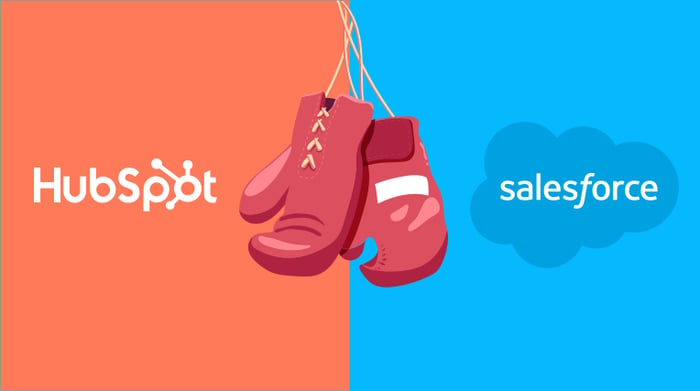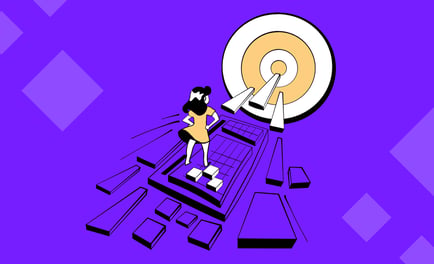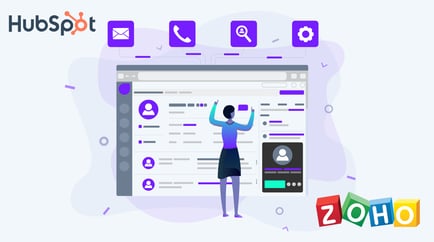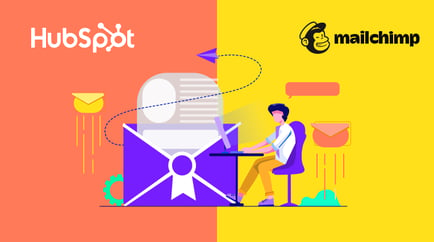What is a CRM?
CRM, an acronym for customer relationship management, involves tools, strategies, or ways to store and organize customer data. Over the years, the advent of technological innovation has shifted the storage of databases from the traditional handwritten method to individual computers.
Hubspot vs. Salesforce are two of the most common CRM available in the world today.
They are both cloud-based and allow you to manage relationships with your customers while you grow and scale your business irrespective of its size.
If you are considering choosing between the two popular platforms, you need to take note of following: pricing, support, ease of use, integration with other software, and feature such as lead generation, capture, and management.
I will provide details about the features of two software in the sub-sections below.
1. Pricing
HubSpot
HubSpot’s CRM has a “free tool” plan that allows you to invite all your team members with unlimited free users. It also has Marketing, CRM & Sales, Customer Service, and CMS plans.
Their Sales Starter plans are pegged at $22.5/user/month (maximum of two users) while the Professional plan is fixed at $90/user/month (maximum of five users). The Professional plus plan costs $120/user/month and $1440/user/month annually (maximum of ten users). You can read more about Hubspot’s pricing here.
Salesforce
However, Salesforce has its least subscription plan at $25/user/month for a maximum of five users. As more features are added, the prices increase. The premium plan offers $300/user/month, an unlimited number of users, and AI-based lead scoring.
Above all, Salesforce is costlier because of the several extra costs that pile up over time. It costs more upfront, although HubSpot add-ons are considered to be more expensive as you scale. You can read more about Salesforce’s pricing here.
2. Support
HubSpot
Hubspot offers customer support like most other software companies. As a Hubspot customer, the first place you would be directed for support is their database of FAQs, articles, documentation, and resources to help you find solutions to your problems.
Besides providing you with a database of documents and articles to guide you, they also offer support through Twitter, email, and phone calls. Moreover, there is an in-app Help button on their website to get answers. However, you will be a paying customer to enjoy most of these benefits.
Salesforce
Salesforce, just like Hubspot, offers support to their clients in various ways. They provide one-on-one customer support only to paying customers while assisting all users in other ways, such as providing a database of articles, documents, and resources.
They have a comprehensive self-help library to help you. If you are a paying customer, you will enjoy their excellent support. Not only that, at an extra price, you can enroll in Salesforce University to help you understand the software.
3. Ease of Use
HubSpot
One of the unique features of Hubspot is its well-designed dashboard. It is conspicuous and provides reports of the performance of you or your sales team.
Hubspot offers a lot of features that can be quite daunting. However, you will find it easy to use. The visual dashboard shows your leads’ sequence from start to finish, which helps you or your team focus on what is important.
Salesforce
Salesforce offers an extensive amount of features and can be a little arduous to use at first. It becomes easy to use when you familiarize yourself with its interface through the self-help library, community support, or Salesforce University by paying for a week’s long learning period. This CRM works for both small and huge enterprise operations.
4. Integration with other software
The ability of CRM software to integrate with third-party software provides total control to your team.
HubSpot
HubSpot App Ecosystem supports a large number of other apps with over 200 integrations. Common examples of such software include WordPress & SnapApp for content, Mailchimp & Outlook for email, and Slack & G Suite for productivity.
Salesforce
Like we have in Hubspot, Salesforce works with top third-party applications, ranging from G Suite and Mailchimp to Quickbooks. Although it integrates with less volume of applications, this platform ensures a smooth transition for your team.
5. Lead Generation, Capture, and Management
HubSpot
HubSpot supports content and inbound marketing (which are its core features) to quickly help small businesses set up, run, and manage their customer relationships.
You can publish blogs and whitepapers using their content management system (CMS) while you get inbound leads by paying an extra fee.
Salesforce
Salesforce features more customization options such as the ability to setup lead capturing rules, append leads to marketing lists, and allow only authorized users to see certain data types through security access. Furthermore, Salesforce scores lead on a scale of 1-100, based on numerous factors.
They both have lead capture functionality that involves importing contact information into their system. For instance, when a visitor makes inquires on your website.
Comparison
The two CRMs also allow users to contact their clients straight from the CRM via email or an integrated external email provider such as Gmail. Thus, it ensures that all forms of communication by emails are logged within the CRM.
Summarily, here are the pros and cons of the two platforms:
- Forever free trial available
- Suitable for large enterprises and sole proprietor
- Super scalable CRM stack and marketing suite
- Easy-to-read dashboards.
- 30-day trial available
- Good for large enterprises and sole proprietor
- Tons of convenient integrations
- Most popular CRM platform
- Bulky feature set can be intimidating
- Costs can pile up quickly when importing more than contacts
- Marketing automation limited to higher-level plans
- Challenging to learn
- Setup is complex
- Time consuming and confusing interface
- Costly if you want a lot of features
Receive resources directly to your inbox
Sign up to get weekly insights & inspiration in your inbox.





